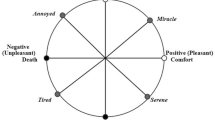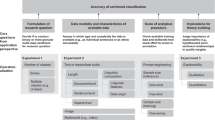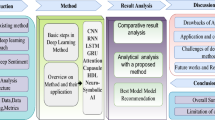Abstract
Nowadays, reviews about the products on online shopping sites become an essential source to help the customer to take better decisions on buying a product and achieve good sales of the product. It becomes a habit for the consumers to share opinions about a recently purchased product immediately on online shopping sites and social media websites. So, there is a huge demand for an intelligent system to detect sentiments from customer reviews under specific aspects of a product posted on online shopping sites. In recent years, various machine learning techniques have been experimented on various benchmark datasets to analyze sentiments expressed by the consumer through online portals. But, consumers are still struggling to get aspect-based sentiments expressed by other consumers, and the accuracy of the existing model is not satisfactory. Hence, we proposed an intelligent system using long-term short memory with fuzzy logic to classify consumer review sentences under various aspects with four different labels, namely highly negative, negative, positive and highly positive. So, consumers who wish to buy a new product from online portal can see multi-label sentiments of the various aspects of the product quickly. The proposed system was experimented on Amazon cell phone review, Amazon video games review and consumer reviews of amazon products benchmark datasets and obtained the results with the accuracy of 96.93%, 83.82% and 90.92%, respectively. The proposed model outperforms in terms of accuracy when compared to the state-of-the-art-methods. The developed system also analyzed the product reviews based on the current trends and geographical location. The proposed system aids the manufacturers for improving the products based on customer complaints.







Similar content being viewed by others
References
Pranjal, S.: Bogawar: soft computing approaches to classification of emails for sentiment analysis. In: ICIA-16: Proceedings of the International Conference on Informatics and Analytics, pp. 1–7 (2016)
Karen, H.: Applying fuzzy logic for sentiment analysis of social media network data in marketing. In: 9th International Conference on Theory and Application of Soft Computing, Computing with Words and Perception, ICSCCW 2017, pp. 24–25 (2017)
Tai, K.S., Socher, R., Manning, C.D.: Improved semantic representations from tree-structured long short-term memory networks. In: International Joint Conference on Natural Language Processing, vol. 1, pp. 1556–1566 (2015)
Ouyang, X., Zhou, P., Li, C.H., Liu, L.: Sentiment analysis using convolutional neural network. In: IEEE International Conference on Computer and Information Technology; Ubiquitous Computing and Communications; Dependable, Autonomic and Secure Computing; Pervasive Intelligence and Computing, pp. 2359–2364 (2015)
Karen, H., Ahmet E.: Applying fuzzy logic for sentiment analysis of social media net-work data in marketing. In: International Conference on Theory and Application of Soft Computing, Computing with Words and Perception, pp. 664–670 (2017)
Fang, Y., Tan, H., Zhang, J.: Multi-strategy sentiment analysis of consumer reviews based on semantic fuzziness. IEEE Access 6, 20625–20631 (2018)
Fu, X., Yang, J., Li, J., Fang, M., Wang, H.: Lexicon-enhanced LSTM with attention for general sentiment analysis. IEEE Access 6, 71884–71891 (2018)
Can, E.F., Ezen-Can, A., Can, F.: Multilingual sentiment analysis: an RNN-based framework for limited data. In: ACM SIGIR 2018 Workshop on Learning from Limited or Noisy Data, vol. abs/1806.04511 (2018)
Aziz, A., Starkey, A.: Predicting supervise machine learning performances for sentiment analysis using contextual-based approaches. In: IEEE Access, vol. 8, pp. 17722–17733 (2020)
Dong, Y., Fu, Y., Wang, L., Chen, Y., Dong, Y., Li, J.: A sentiment analysis method of capsule network based on BiLSTM. IEEE Access 8, 37014–37020 (2020)
Zuo, E., Zhao, H., Chen, B., Chen, Q.: Context-specific heterogeneous graph convolutional net-work for implicit sentiment analysis. IEEE Access 8, 37967–37975 (2020)
Basiri, M.E., et al.: Improving sentiment polarity detection through target identification. IEEE Trans. Comput. Soc. Syst. 7(1), 113–128 (2020)
Shams, M., Khoshavi, N., Baraani-Dastjerdi, A.: LISA: language-independent method for aspect-based sentiment analysis. IEEE Access 8, 31034–31044 (2020)
Del Corro, L., Gemulla, R.: ClausIE: clause-based open information extraction. In: Proceedings of the 22nd international conference on World Wide Web, pp. 355–366 (2013)
Bie, Y., Yang, Y.: A multitask multiview neural network for end-to-end aspect-based sentiment analysis. Big Data Min. Anal. 4(3), 195–207 (2021)
Dzisevič, R., Šešok, D.: Text classification using different feature extraction approaches. In: Open Conference of Electrical, Electronic and Information Sciences (eStream), pp. 1–4 (2019)
Zhang, W., Xu, W., Chen, G., Guo, J: A feature extraction method based on word embedding for word similarity computing. In: NLPCC 2014, CCIS 496, pp. 160–167 (2014)
Ali, W., Yang, Y., Qiu, X., Ke, Y., Wang, Y.: Aspect-level sentiment analysis based on bidirectional-GRU in SIoT. IEEE Access 9, 69938–69950 (2021)
https://www.kaggle.com/datafiniti/consumer-reviews-of-amazon-products
Author information
Authors and Affiliations
Corresponding author
Ethics declarations
Conflict of interest
The authors declare that they have no conflict of interest.
Additional information
Publisher's Note
Springer Nature remains neutral with regard to jurisdictional claims in published maps and institutional affiliations.
Rights and permissions
About this article
Cite this article
Sivakumar, M., Uyyala, S.R. Aspect-based sentiment analysis of mobile phone reviews using LSTM and fuzzy logic. Int J Data Sci Anal 12, 355–367 (2021). https://doi.org/10.1007/s41060-021-00277-x
Received:
Accepted:
Published:
Issue Date:
DOI: https://doi.org/10.1007/s41060-021-00277-x




